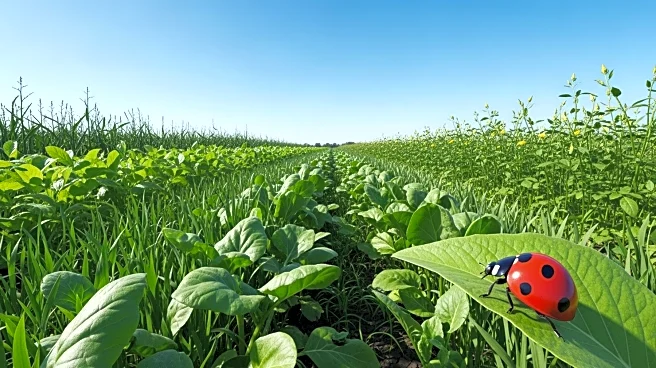What's Happening?
Farmers across Europe are increasingly adopting Integrated Pest Management (IPM) to reduce reliance on chemical pesticides, which are known to pollute soil, water, and air, and pose risks to human health.
IPM involves using natural processes and biological controls, such as ladybirds and beneficial fungi, to manage pests. The EU-funded initiative, IPMWORKS, has been instrumental in promoting IPM by creating networks of pioneering farmers who share experiences and solutions. Despite IPM being mandatory in the EU since 2014, adoption has been slow, with many farmers still heavily dependent on pesticides. The initiative aims to demonstrate that IPM can be cost-effective and environmentally friendly, offering better pest control without compromising profits.
Why It's Important?
The shift towards Integrated Pest Management is significant as it addresses the environmental and health concerns associated with chemical pesticides. By reducing pesticide use, farmers can contribute to cleaner water, healthier soils, and increased biodiversity. This approach also offers economic benefits by potentially lowering costs associated with pesticide purchases. The success of IPM could lead to a substantial reduction in pesticide use across Europe, enhancing food security and environmental sustainability. Farmers stand to gain from improved pest control methods that do not compromise their profits, while society benefits from healthier ecosystems and reduced health risks.
What's Next?
The continued expansion of IPM practices depends on overcoming farmers' fears about potential crop value loss and changing mindsets to view IPM as an economic opportunity. Financial incentives and educational resources, such as training modules and the IPM Resource Toolbox, are crucial for encouraging adoption. The initiative's success could lead to broader implementation across Europe, aiming for a 50% reduction in pesticide use without affecting food security. The challenge lies in scaling up these efforts to ensure a sustainable future for farming that benefits both the environment and agricultural profitability.
Beyond the Headlines
The adoption of Integrated Pest Management represents a cultural shift in farming practices, emphasizing collaboration with nature rather than reliance on chemical solutions. This approach not only protects the environment but also aligns with ethical considerations of sustainable agriculture. As farmers increasingly recognize their role in environmental stewardship, IPM could lead to long-term changes in agricultural practices, fostering a more harmonious relationship between farming and nature.









